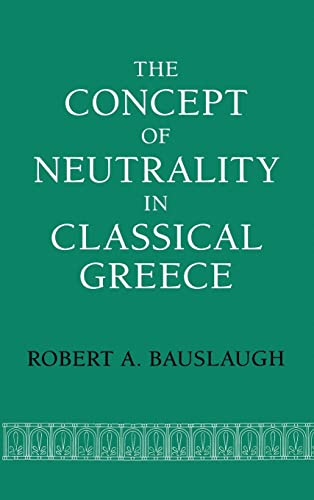The Concept of Neutrality in Classical Greece


sku: COM9780520066878NEW
ACCORDING TO OUR RECORDS THIS PRODUCT IS NOT AVAILABLE NOW
$16.14
Shipping from: Canada
Description
Looking at Classical warfare from the perspective of the non-belligerents, Robert A. Bauslaugh brings together the scattered evidence testifying to neutral behavior among the Greek city-states and their non-Greek neighbors. Were the Argives of 480/479 B.C. really "Medizers," as many have accused, or were they pursuing a justifiable policy of neutrality as they claimed? On what basis in international law or custom did the Corcyraeans claim non-alignment? Why were the leading belligerent states willing to accept the inclusion of a "neutrality clause" in the Common Peace of 371? These questions have not been asked by historians of international law, and the answers provide a far more complex and sophisticated picture of interstate relations than has so far been available.Despite the absence of exclusively diplomatic language, the concept of respect for neutrals appears early in Greek history and remains a nearly constant feature of Classical wars. The problems confronting uncommitted states, which have clear parallels in modern history, were balanced by widespread acceptance of the need for limitations on the chaos of warfare.
Price history chart & currency exchange rate
Customers also viewed

$1.91
31KA 4pieces Alloy-Oval Wardrobe Hanging-Rail Rod End Flange Hanging-Rail Rod Wardrobe Pipe Brackets Curtain Brackets
aliexpress.com
$3.20
70g Astragalus Cream Day Night Cream Moisturizing Improving Roughness Tenderness Beauty Repair Cream Skin Care
aliexpress.com
$789.52
Rock slab folding table light luxury simple modern retractable small apartment household storage mobile solid wood and chairs
aliexpress.ru
$59.79
2X регулятор для подводного плавания, трубка, шланг высокого давления для подводного плавания, замена регулятора для подводного плавания в водных видов спорта
aliexpress.ru
$95.00
New Balance Boys New Balance 550 - Boys' Grade School Basketball Shoes Tan/White/Blue Size 4.0
champssports.com
$25.91
StarGems®Уникальные серьги ручной работы из натурального лунного камня в виде радуги из серебра 1,75 дюйма A2744
aliexpress.ru
$2.87
10Pcs Hair Styling Tool Ponytail Maker Topsy Hair Tail Tools Women Hairstyle 1560
aliexpress.com
$5.34
Женская сумка с рисунком милой панды, трикотажная сумка на запястье, японская и Корейская универсальная ручная Повседневная Сумка-тоут, сумка для ланча, оптовая продажа
aliexpress.ru
$266.45
220V Buydeem серия North Pro диспенсер для воды-умный и компактный Настольный диспенсер горячей воды для дома
aliexpress.ru
$13.48
Пластиковая прозрачная ручка, подарок для школы и офиса, набор из 25 предметов, контейнер для хранения ручек на День отца, День матери
aliexpress.com
$5.33
Модная женская сексуальная мини-юбка с эластичным поясом, многослойная юбка, однотонная летняя трапециевидная юбка, Клубная одежда для улицы, Женская
aliexpress.ru
$15.98
Новинка для VW Lupo 1998-2005 1997-2004 для передней двери Seat Arosa, контрольный ремень 6E0 837 249 C 6E0 837 249C 6E0837249C 6X0837249
aliexpress.ru
$30.81
Outdoor Color Matching Hammock Camping Double 210T Nylon Parachute Fabric Bed for Easy Carrying Outdoor Essential
aliexpress.com
$17.53
Кромкообрезной станок для бумаги, оборудование для фотосъемки в офисе, машина для резки изогнутых углов, триммер для бизнеса, устройство для зеркальной фотосъемки
aliexpress.com
$3.44
Suitable For Mamibot EXVAC660, EXVAC680S Mamibot 880 Tesvor X500 Pro Accessory Middle Sweep Protective Cover Household Supplies
aliexpress.com
$11.40
Новинка 2022 года, карта провинций Хуэй-Китай, серия 1068x74, 9 мм/42x29,5 дюйма, китайская версия, стандартная Складная
aliexpress.ru
$27.39
Книга об основаниях для нового письма, Обучающая книга для изучения красивых подробностей, книга для обучения новым навыкам письма, Обучающая книга
aliexpress.ru
$18.19
Cat Bag Out Portable Pet Backpack Dog Canvas Bag Shoulder Bag Carrying Dog Travel Carrier Fashion Backpacks Pet Accessories
aliexpress.com
$29.99
Хромированный воздушный дефлектор для Harley Electra Glide Road King Street Glide Tri Glide
aliexpress.ru
$60.88
Дизайнерские Сумки LA фестиn для женщин, новинка 2021, модные сумки-мессенджеры на одно плечо, кожаные сумки через плечо, женская сумка-мешок
aliexpress.ru
$15.59
22mm 24mm 26mm Replacement Watch Strap Bands for Panerai Garmin Watch Straps Leather Blue Watchbands for Sunnto Pulseira Relogio
aliexpress.com
$77.72
creative solid wood led bedside lamp bedroom lamp l corridor restaurant idyllic wall lamps industrial wall lamp for reading
dhgate.com












